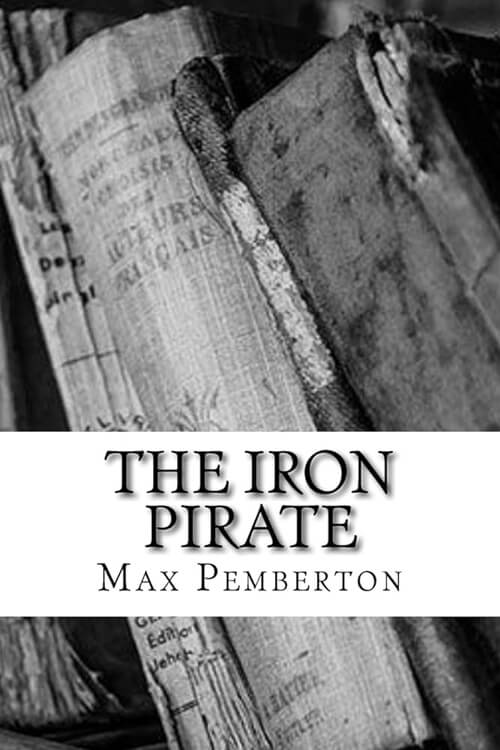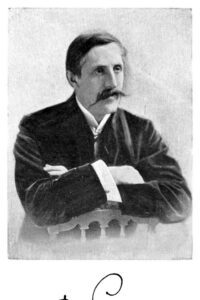
The Iron Pirate, A Plain Tale of Strange Happenings on the Sea
If it has not been your privilege to hear a French guard utter these words, you have lost a lesson in the dignity of elocution which nothing can replace. “En voiture, en voiture; five minutes for Paris.” At the well-delivered warning, the Englishman in the adjoining buffet raises on high the frothing tankard, and vaunts before the world his capacity for deep draughts and long; the fair American spills her coffee and looks an exclamation; the Bishop pays for his daughter’s tea, drops the change in the one chink which the buffet boards disclose, and thinks one; the travelled person, disdaining haste, smiles on all with a pitying leer; the foolish man, who has forgotten something, makes public his conviction that he will lose his train. The adamantine official alone is at his ease, and, as the minutes go by, the knell of the train-loser sounds the deeper, the horrid jargon is yet more irritating.
I thought all these things, and more, as I waited for the Perfect Fool at the door of my carriage in the harbour station at Calais. He was truly an impossible man, that small-eyed, short-haired, stooping mystery I had met at Cowes a month before, and formed so strange a friendship with. Today he would do this, to-morrow he would not; today he had a theory that the world was egg-shaped, to-morrow he believed it to be round; in one moment he was hot upon a journey to St. Petersburg, in the next he felt that the Pacific Islands offered a better opportunity. If he had a second coat, no man had ever seen it; if he had a purpose in life, no man, I hold, had ever known it. And yet there was a fascination about him you could not resist; in his visible, palpitating, stultifying folly there was something so amazing that you drew to the man as to that unknown something which the world had not yet given to you, as a treasure to be worn daily in the privacy of your enjoyment. I had, as I have said, picked the Perfect Fool up at Cowes, whither I had taken my yacht, Celsis, for the Regatta Week; and he had clung to me ever since with a dogged obstinacy that was a triumph. He had taken of my bread and eaten of my salt unasked; he was not a man such as the men I knew—he was interested in nothing, not even in himself—and yet I tolerated him. And in return for this toleration, he was about to make me lose a train for Paris.
“Will you come on?” I roared for the tenth time, as the cracked bell jangled and the guards hoisted the last stout person into the only carriage where there was not a seat for her. “Don’t you see we shall be left behind? Hurry up!
Read or download Book
Max Pemberton
Sir Max Pemberton JP (19 June 1863 – 22 February 1950) was a popular English novelist and publisher working mainly in the adventure and mystery genres.
Life
He was educated at St Albans School, Merchant Taylors’ School, and Caius College, Cambridge. A club man, journalist, and dandy (Lord Northcliffe admired his ‘fancy vests’), he frequented both Fleet Street and The Savage Club.
Pemberton was the editor of boys’ magazine Chums in 1892–1893 during its heyday. Between 1896 and 1906 he also edited Cassell’s Magazine, in which capacity he published the early works of R. Austin Freeman and William Le Queux.
His most famous work The Iron Pirate was a best-seller during the early 1890s and it initiated his prolific writing career. It was the story of a great gas-driven iron-clad, which could outpace the navies of the world and terrorize the shipping of the Atlantic Ocean. Other notable works included Captain Black (1911). Pemberton’s 1894 collection Jewel Mysteries: From a Dealer’s Notebook was a series of Mystery stories revolving around stolen jewels. Pemberton also wrote historical fiction. Pemberton’s I Crown Thee King is set in Sherwood Forest during the time of Mary I. His novels Beatrice of Venice (1904) and Paulina (1922) center on Napoleon’s military campaigns in Italy.
In January 1908, just one year after the death of Pemberton’s friend and fellow Crimes Club member, Bertram Fletcher Robinson, he had a story titled Wheels of Anarchy published by Cassell (publisher). This book includes the following book dedication in the form of an ‘Author’s Note’:
This story was suggested to me by the late B. Fletcher Robinson deeply mourned. The subject was one in which he had interested himself for some years, and almost the last message I had from him expressed the desire that I would keep my promise and treat the idea in a book. This I have now done, adding something of my own to the brief notes he left me but chiefly bringing to the task an enduring gratitude for a friendship which nothing can replace.






